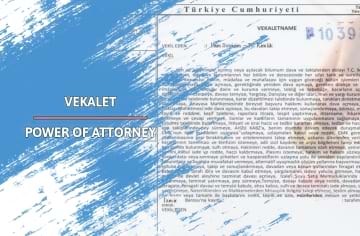
Hisseli tapu (shared title deed in Turkey)

Hisseli tapu is a type of property ownership in Turkey where multiple parties hold a shared title deed for the same real estate. Unlike a standard kat mülkiyeti (condominium ownership), this system does not divide the property into distinct, legally independent units. Instead, each co-owner holds a percentage-based share (e.g., 50%, 30%, 20%) of the entire property, not a specific physical section.
The deed itself lists all co-owners and their respective shares. Decisions about the property—such as sales, renovations, or rentals—typically require unanimous agreement from all shareholders unless otherwise specified in a notarial agreement. This structure is common in inherited properties, joint investments, or undeveloped land where division is impractical.
Key features:
- No physical division: Shares are abstract percentages, not tied to specific rooms or areas.
- Joint liability: All co-owners share responsibilities (e.g., taxes, maintenance) proportionally.
- Transfer restrictions: Selling a share may require other owners' consent, depending on the deed’s terms.
This system differs from kat irtıfağı (floor easement) or müstakil tapu (independent deed), where ownership is tied to distinct units or standalone properties.
| Turkish Term | English Equivalent | Notes |
|---|---|---|
| Hisseli tapu | Shared title deed | Primary term for percentage-based co-ownership. |
| Paylı mülkiyet | Joint ownership | Legal term for shared property rights (broader than hisseli tapu). |
| Ortak tapu | Co-owned deed | Colloquial alternative, less formal. |
| Müşterek tapu | Common deed | Older term, rarely used in modern transactions. |
| Hisse senedi | Share certificate | Refers to the document proving an individual’s share (not the deed itself). |

Shared ownership deed with defined fractions.
Hisseli tapu is a type of property deed in Turkey indicating shared ownership. Each owner holds a specific fraction (hisse) of the property, often expressed as a percentage (e.g., 1/2 or 50%).
This system is common in inherited properties, joint purchases, or when a property is divided among multiple parties. Each co-owner has rights proportional to their share, but decisions (e.g., sale, renovation) typically require unanimous or majority consent.
Unlike sole ownership (kat mülkiyeti for apartments), hisseli tapu does not grant exclusive use of a specific part unless legally agreed. Disputes may arise if co-owners disagree on usage or sales.
Yes, but with legal considerations.
Foreigners can purchase a property with hisseli tapu in Turkey, provided they meet general eligibility (e.g., reciprocity rules for their nationality). The share (hisse) bought must comply with Turkey’s foreign ownership limits (max 30 hectares nationwide).
The process requires checking the Land Registry (Tapu Dairesi) for liens or disputes. Co-owners must approve the sale of a fraction unless the share is independently marketable. Military clearance is still required for properties in restricted zones.
Note: Some banks may hesitate to finance hisseli tapu properties due to higher dispute risks. Always verify the share’s legal status before purchase.
Proportional usage, sale, and income rights.
Under hisseli tapu, each co-owner has rights based on their share (hisse). These include:
Usage: Right to use the property proportionally (e.g., a 30% share entitles 30% of usage time/space). Exclusive use requires a separate agreement.
Sale/Transfer: Owners can sell or transfer their share unless restricted by prior contracts. Co-owners may have preemption rights (first refusal).
Income/Rent: Rental income or profits from sales are divided by share. Disputes over distributions are resolved in court.
Decision-making: Major changes (e.g., demolition) usually require all co-owners’ consent. Minor repairs may need majority approval.
Shared vs. independent ownership structures.
Hisseli tapu and kat mülkiyeti (condominium ownership) are distinct legal structures in Turkey:
Hisseli tapu: Shared ownership of a single property (e.g., a villa or land). Each owner holds a fraction (hisse) of the whole, with no exclusive zones unless agreed.
Kat mülkiyeti: Independent ownership of specific units (e.g., an apartment in a building). Owners have sole rights to their unit plus shared rights to common areas (e.g., gardens).
Key difference: Kat mülkiyeti allows exclusive use of a defined space, while hisseli tapu does not—unless co-owners sign a usage agreement. Conversion from hisseli tapu to kat mülkiyeti is possible for eligible properties (e.g., divided buildings).
Disputes, limited control, and resale challenges.
Buying hisseli tapu property in Turkey carries specific risks:
Disputes: Co-owners may disagree on usage, sales, or maintenance. Legal battles can freeze decisions or block sales.
Limited control: Major changes (e.g., renovations) require approval from all or most co-owners, delaying projects.
Resale difficulties: Fractions are harder to sell than whole properties. Buyers may avoid shares due to inheritance or legal complexities.
Financial risks: If one co-owner defaults on taxes or debts, others may face liens on the entire property.
Inheritance issues: Shares can fragment further if inherited, increasing future disputes. Always check the property’s dispute history in the Land Registry.
Buyout shares or legal partition required.
Converting hisseli tapu to sole ownership in Turkey requires eliminating all other shares. Common methods:
Buyout: Negotiate to purchase all co-owners’ shares. Prices must be fair market value to avoid legal challenges.
Partition (Taksim): File a taksim davası (partition lawsuit) to physically divide the property (e.g., land splits). Courts may order division or sale if co-owners disagree.
Agreement: Co-owners can voluntarily sign a notarized transfer of shares to one party.
Note: Some properties (e.g., undivided buildings) may qualify for conversion to kat mülkiyeti (condominium deeds) if structurally feasible. Consult a Turkish property lawyer to assess options.
Shares transfer to heirs, increasing fragmentation.
If a hisseli tapu co-owner dies in Turkey, their share (hisse) is inherited according to Turkish succession law or their will. Key outcomes:
Legal heirs: Spouses, children, or parents inherit the share automatically unless a will specifies otherwise. Foreign wills must be probated in Turkey.
Fragmentation: The share may split among multiple heirs (e.g., 3 children each inherit 10%), complicating future decisions.
Usage rights: Heirs gain proportional rights but must agree with other co-owners on property management.
Sale restrictions: Heirs can sell their inherited share, but co-owners may have preemption rights. Inheritance tax (1%–30%) applies based on the heir’s relation to the deceased.
Standard property taxes apply per share.
Hisseli tapu owners in Turkey pay the same property taxes as sole owners, but calculated proportionally per share. Key fees:
Annual Property Tax (Emlak Vergisi):Calculated of the share’s tax value, depending on property type (residential/commercial) and location.
Title Deed Fee (Tapu Harcı): A percentage of the declared sale value when transferring a share.
Capital Gains Tax: If selling a share within 5 years of purchase, tax rates range from 15% to 35% on profit (exemptions apply for primary residences).
Inheritance Tax: 1%–30% of the share’s value for heirs, depending on their relation to the deceased.
Co-owners are jointly liable for unpaid taxes on the entire property, not just their share.
Also read


Imza (Signature) in Turkish real estate – what it means for you

DASK (Natural Disaster Insurance) in Turkey – What It Covers

Vekalet (Power of Attorney) in Turkey – What It Means for Property Buyers

Taksit (installment) – what it means in Turkish real estate

Teklif (Offer) – Understanding the Term in Turkish Real Estate

Havuz (Swimming Pool) – Meaning in Turkish Real Estate

Kat mülkiyeti kanunu (Condominium Ownership Law)

Asansör (Elevator) – What It Means in Turkish Real Estate
